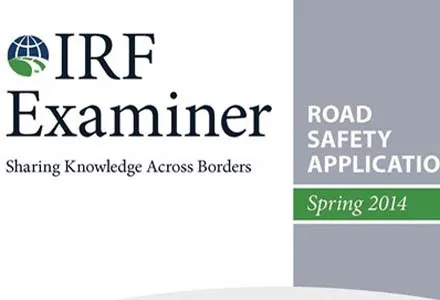The US Department of Transportation Federal Highway Administration (FHWA) has awarded Delcan a contract to build a flexible, scalable and adaptable framework structure for Traffic Incident Management (TIM). Delcan is collaborating with SAIC on this effort.TIM is the practice of implementing a coordinated multi-disciplinary effort to swiftly clear traffic incidents off of roadways for increased public safety, more efficient mobility and reduce negative emission impacts on the environment.
May 4, 2012
Read time: 3 mins
Cambridge Consultants has released a report, “The Efficient Journey: Creating a commercial reality or just a dream?” discussing the critical needs and opportunities presented by ageing and inefficient transport systems across Europe.
The report examines the current situation in the transport sector and defines the efficient journey as the one with the smallest carbon footprint with most economic and social benefits. It also explores the many factors in business and customer transportation decisions, which go far beyond CO2 emissions, looking at how to modify behaviour and the use of market signals to achieve better outcomes. Also included are several case studies looking at major shifts in transportation behaviour, government projects and market driven solutions, examining projects from Los Angeles to Stockholm.
The report suggests several possible solutions to decrease transport’s carbon footprint. Controlling price is a notable tool, including price increases on less efficient travel methods, and higher pricing as a load balancing tool during peak travel times. Intriguingly, mobile devices could play a significant role in allowing consumers to make better-informed decisions. Sophisticated automotive ‘Black Boxes’ could provide data to Pay-as-You Drive insurance, in-vehicle driver advice (e.g. the optimum gear for a given speed) and fuel monitoring. Social media could also play a key role, as real-time information-sharing among peers gains increasing influence over behaviour.
Four broad categories are identified by which to measure “the efficient journey”: transportation, technological, economic and experiential. These cover costs (economic, financial and social), fuel efficiency, energy storage, resource allocation and traveller experience. Once the goal of diminishing travel’s carbon footprint is established, some disagreement on how to address the goal drives competition, and competition drives innovative solutions.
“Behaviour will not change based purely on scientific arguments, particularly when it comes to travel choices. With transport accounting for 20-25 per cent of world energy consumption, we must be resolute in our determination to effect significant change in infrastructure, technology and consumer decisions” said Dr. Liz Orme, commercial director of energy and transport, Cambridge Consultants. “Surprisingly, large government funded infrastructure projects are not necessarily the solution. Our conversations suggest that governments need to set broader transportation goals and then focus on market mechanisms to drive behavioural changes and allow competition to drive innovation.”
To request a full copy of “The Efficient Journey”, visit
www.%$Linker:External 0 0 0 oLinkExternal cambridgeconsultants.com/fm_transport_2011.html THe Efficient Journey false http://www.cambridgeconsultants.com/fm_transport_2011.html false false %>
The report examines the current situation in the transport sector and defines the efficient journey as the one with the smallest carbon footprint with most economic and social benefits. It also explores the many factors in business and customer transportation decisions, which go far beyond CO2 emissions, looking at how to modify behaviour and the use of market signals to achieve better outcomes. Also included are several case studies looking at major shifts in transportation behaviour, government projects and market driven solutions, examining projects from Los Angeles to Stockholm.
The report suggests several possible solutions to decrease transport’s carbon footprint. Controlling price is a notable tool, including price increases on less efficient travel methods, and higher pricing as a load balancing tool during peak travel times. Intriguingly, mobile devices could play a significant role in allowing consumers to make better-informed decisions. Sophisticated automotive ‘Black Boxes’ could provide data to Pay-as-You Drive insurance, in-vehicle driver advice (e.g. the optimum gear for a given speed) and fuel monitoring. Social media could also play a key role, as real-time information-sharing among peers gains increasing influence over behaviour.
Four broad categories are identified by which to measure “the efficient journey”: transportation, technological, economic and experiential. These cover costs (economic, financial and social), fuel efficiency, energy storage, resource allocation and traveller experience. Once the goal of diminishing travel’s carbon footprint is established, some disagreement on how to address the goal drives competition, and competition drives innovative solutions.
“Behaviour will not change based purely on scientific arguments, particularly when it comes to travel choices. With transport accounting for 20-25 per cent of world energy consumption, we must be resolute in our determination to effect significant change in infrastructure, technology and consumer decisions” said Dr. Liz Orme, commercial director of energy and transport, Cambridge Consultants. “Surprisingly, large government funded infrastructure projects are not necessarily the solution. Our conversations suggest that governments need to set broader transportation goals and then focus on market mechanisms to drive behavioural changes and allow competition to drive innovation.”
To request a full copy of “The Efficient Journey”, visit
www.%$Linker:







